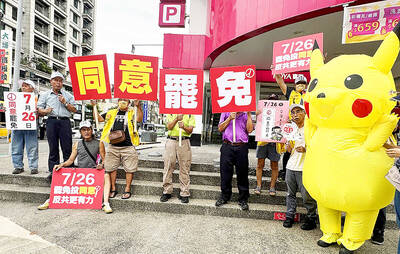Akiko Yosano’s Midaregami (Tangled Hair) caused a sensation when it was published early in the last century. Critics praised the Japanese poet’s deft lyricism while women lauded its feminine themes, leading one later reviewer to call her the Mary Wollstonecraft of Japan.
Local poet and filmmaker Hung Hung (鴻鴻) revives the work this weekend at Guling Street Theater (牯嶺街小劇場) and will direct Yosano’s words in a performance of music and acting. Billed as a shadow play, the show serves as the coda for this year’s Taipei Poetry Festival (臺北詩歌節).
“Tangled hair,” said Hung Hung, also the festival’s curator. “It’s a great image.”
In early 20th-century Japan the words “tangled hair” conjured up images of confusion, chaos and even madness. The phrase, however, is also an opaque reference to the state of a woman’s hair after making love — a sense of freedom that in Yosano’s deft hands grows to include the emancipation of women from a strict patriarchal society.
The “poetry performance,” as Hung Hung calls it, also incorporates poetry written by Hakka poet Tu-pan Fang-ko (杜潘芳格) who, similar to Yosano, explores female independence in traditional societies.
Hung Hung’s team of poets distilled Tu-pan’s work into a piece that seeks to preserve the lyricism of the original while adding musical and theatrical elements that visually highlight the original themes of “intimacy and [women’s] complicated external situations.”
The poetry for Midaregami is based on a script compiled and edited by local poet Hsia Hsia (夏夏) of Poetry in a Matchbox (火柴詩) fame and will be read by experimental theater actor Wu Kun-da (吳昆達). Two musicians will also perform live: accordion player Wang Yang-meng (王雁盟); and Wang Wen-hsuan (王文萱), who will play the samisen (a traditional Japanese three-stringed lute used to play folk music) to complement the spoken poetry and shadow puppetry. The shadow puppets were created by shadow puppet director Shih Pei-yu (石佩玉) of the Flying Group Theater (飛人集社劇團).
Midaregami will be performed tonight at 7:30pm and 9pm, tomorrow at 3:30pm, 5pm and 6:30pm and Sunday at 4pm and 5:30pm at Guling Street Theater (牯嶺街小劇場), 2, Ln 5, Guling St, Taipei City (台北市牯嶺街5巷2號). NT$150 tickets are available through NTCH ticketing.
— NOAH BUCHAN

From the last quarter of 2001, research shows that real housing prices nearly tripled (before a 2012 law to enforce housing price registration, researchers tracked a few large real estate firms to estimate housing price behavior). Incomes have not kept pace, though this has not yet led to defaults. Instead, an increasing chunk of household income goes to mortgage payments. This suggests that even if incomes grow, the mortgage squeeze will still make voters feel like their paychecks won’t stretch to cover expenses. The housing price rises in the last two decades are now driving higher rents. The rental market

July 21 to July 27 If the “Taiwan Independence Association” (TIA) incident had happened four years earlier, it probably wouldn’t have caused much of an uproar. But the arrest of four young suspected independence activists in the early hours of May 9, 1991, sparked outrage, with many denouncing it as a return to the White Terror — a time when anyone could be detained for suspected seditious activity. Not only had martial law been lifted in 1987, just days earlier on May 1, the government had abolished the Temporary Provisions Effective During the Period of National Mobilization for Suppression of the Communist

Fifty-five years ago, a .25-caliber Beretta fired in the revolving door of New York’s Plaza Hotel set Taiwan on an unexpected path to democracy. As Chinese military incursions intensify today, a new documentary, When the Spring Rain Falls (春雨424), revisits that 1970 assassination attempt on then-vice premier Chiang Ching-kuo (蔣經國). Director Sylvia Feng (馮賢賢) raises the question Taiwan faces under existential threat: “How do we safeguard our fragile democracy and precious freedom?” ASSASSINATION After its retreat to Taiwan in 1949, the Chinese Nationalist Party (KMT) regime under Chiang Kai-shek (蔣介石) imposed a ruthless military rule, crushing democratic aspirations and kidnapping dissidents from

Fundamentally, this Saturday’s recall vote on 24 Chinese Nationalist Party (KMT) lawmakers is a democratic battle of wills between hardcore supporters of Taiwan sovereignty and the KMT incumbents’ core supporters. The recall campaigners have a key asset: clarity of purpose. Stripped to the core, their mission is to defend Taiwan’s sovereignty and democracy from the Chinese Communist Party (CCP). They understand a basic truth, the CCP is — in their own words — at war with Taiwan and Western democracies. Their “unrestricted warfare” campaign to undermine and destroy Taiwan from within is explicit, while simultaneously conducting rehearsals almost daily for invasion,